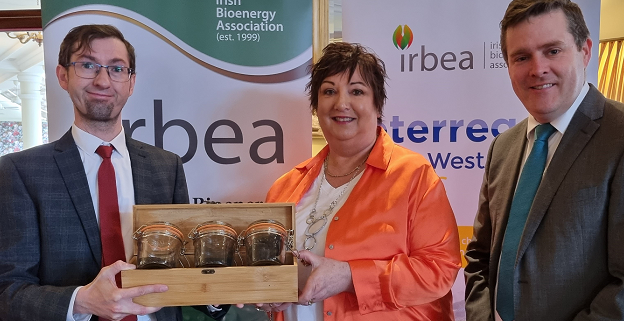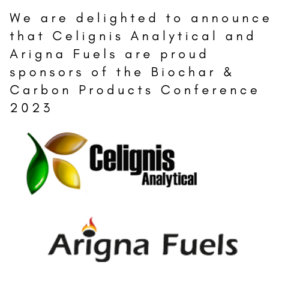PRESS RELEASE: IrBEA launches National Biochar and Carbon Products conference
For immediate release
The Irish Bioenergy Association (IrBEA) is delighted to launch its upcoming National Biochar and Carbon Products conference, which will take place on Wednesday 3rd of May in the Landmark Hotel , Carrick-On-Shannon, Co Leitrim. IrBEA, as the national representative body for the biochar and carbon products sector, seeks to raise the profile of these sectors here in Ireland. Biochar is a stable form of charcoal, produced from a wide variety of biomass streams using pyrolysis (heating without oxygen) technology. It is increasingly recognised for the important role it can play in environmental or agricultural applications.
IrBEA project executive Stephen McCormack, said: “ we look forward to welcoming delegates to this conference and we are delighted that Leitrim County Council Cathaoirleach, Cllr. Ita Reynolds Flynn could join us for the launch photograph. This event will bring together farmers, foresters, biochar producers, users and practitioners from around Ireland and Europe to discuss the potential of biochar and the development of carbon products and their role in a modern world.”
Speakers at the conference will be covering the topics of carbon farming and the potential for biochar, use of biochar within construction materials, biochar’s role within water quality ,its role within our farming community and the benefit it can have a soil or slurry amendment, and also its role as a growing media within the horticultural sector. The event will be sponsored by Arigna Fuels and Celignis Analytical , two key players within the sector in Ireland.
Brendan Layden, Managing Director of Arigna Fuels said: “Arigna Fuels produce both high quality biochar and Harvest Flame, a 100% renewable biomass product aimed at the home heating market. We are delighted to sponsor this National Biochar and Carbon products conference, here in the North West- as early innovators in the sector , it is great to see the interest around this grow and we look forward to welcoming attendees on the day.”
Danial Hayes , of Celignis Analytical said “We here at Celignis have seen the emergence of this sector grow over the past few years, leading to us developing a suite of testing packages capable of serving the needs of Irish companies. By providing access to quality data and analysis as well as research, we hope to support the sector as it develops further.
Biochar and renewable carbon based products have seen a surge in growth globally in the last decade. But many people are still unaware of exactly what it is, the role it can play in carbon sequestration, how it is being used for environmental or agricultural applications or even its role in adding value to residual biomass or for the provision of bioenergy. IrBEA have been involved in a series of Interreg NWE funded projects (THREE C- Creating the circular carbon economy) exploring these topics and it is through this work we hope to continue to raise awareness and shine a light on the many potential benefits this emerging sector can offer.
Seán Finan, CEO of IrBEA concluded” We look forward to welcoming our European colleagues to Ireland , who we have worked closely with over a number of years through our involvement in the EU funded Interreg NWE programme. The conference delegates will hear from a European political perspective, with Midlands North West Colm Markey MEP providing an insight into the current policy discussions in the European Parliament on carbon farming and the potential opportunity for Irish farmers and business.”
Further information regarding the conference please visit www.irbea.org
Ends




